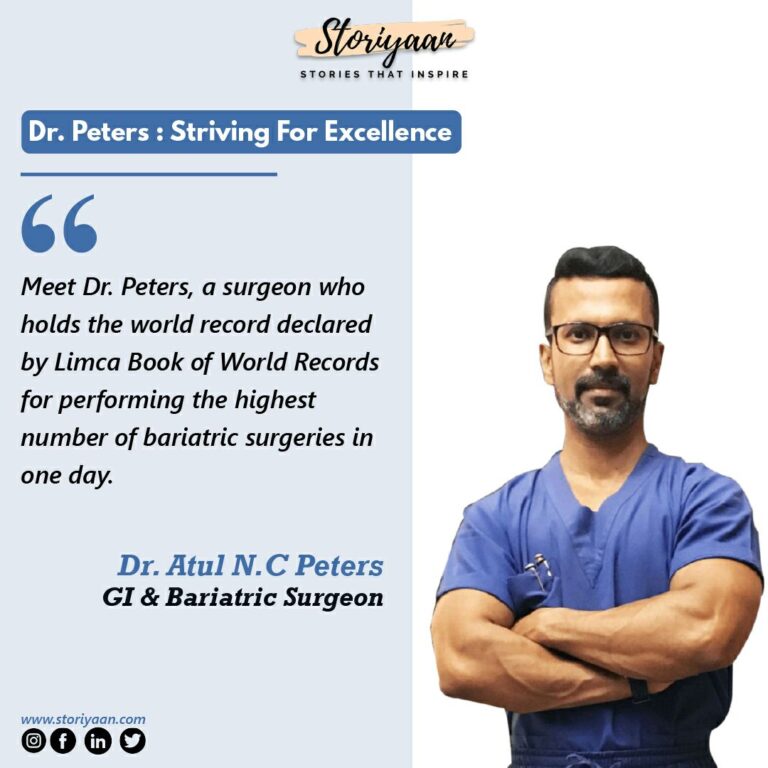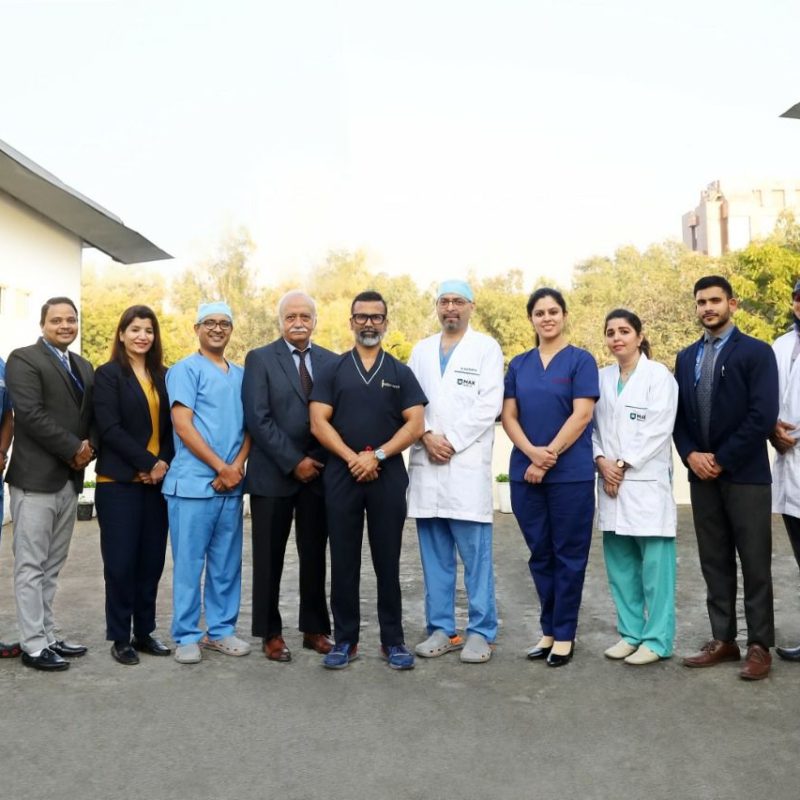In today’s era obesity and diabetes have become increasingly frequent. There are various ways to manage it, however, morbid obesity and uncontrolled diabetes requires medical attention. Bariatric and Metabolic surgery is a worldwide accepted treatment of morbid obesity and uncontrolled diabetes. Dr. Atul N.C Peters is a world renowned bariatric and metabolic surgeon. Currently, he is the Director for Dept. of Bariatric, Minimal Access and General Surgery.
Dr. Peters has been accredited the “Surgeon of Excellence” by Surgical Review Corporation, USA, and also holds the world record of performing the highest number of Bariatric surgeries in a day, declared by the Limca Book of World Records. He is also a member of numerous national and international surgical societies. His expertise isn’t just limited to surgery, he is also a certified fitness trainer and loves playing musical instruments such as saxophone, flute, drums, and guitar!
He is surely an inspiration for all the medicos out there who struggle with time management and find it difficult to strike a balance between various activities. Keep reading further as Dr. Peters shares with us his journey as a surgeon and also provides tips and tricks to the budding surgeons, in this conversation with Storiyaan.

DR. ATUL N.C PETERS- STRIVING FOR EXCELLENCE
Interview
Questions and answers
You hold professional fellowships/ memberships in various National & International Surgical societies. How did your niche grow in the field of surgery, and what were the reasons you started practicing it?
As a kid I wanted to become a doctor, my family also supported me in my dream, and I got into Christian Medical College, Ludhiana which is one of the best medical institutes in our country. Our batch had limited students, the teachers were brilliant and dedicated, so I can say my interest in medicine properly started when I was an undergraduate student. I am thankful to God that I get to touch so many lives daily. And one thing about me is that I love to learn, hence the fellowships and keen interest in research work.
Could you explain what actually is a bariatric treatment and how is this used in a medical setting?
Bariatric surgery, also called weight-loss surgery or metabolic surgery, is offered to people suffering from morbid obesity or uncontrolled diabetes. This surgery is performed on your stomach and intestines, because of which your imbalanced hormones normalise resulting in improved metabolism. With the help of this surgery, you don’t just lose weight, other health issues like diabetes, high blood pressure, PCOD, infertility and sleep problems also get resolved or improve.
Share with us some roadblocks which you have faced in your life that you have emerged successful through sheer hard work.
As a surgeon, you are bound to face roadblocks, at times your way of working and ideology may differ. I have worked at multiple high-end hospitals over the years, and I feel blessed and lucky to have an amazing team supporting me. And with hard work and resilience, I have managed to reach where I am today.
These days many diabetic patients go through Metabolic surgery. What are some of the pros and cons of this surgery and can anyone with diabetes go through this surgery?
The major advantage of this surgery is that if you are diabetic and you opt for metabolic surgery you no longer have to take diabetic medications or insulin afterward or the dosage is reduced, it differs from patient to patient. Basically, better sugar control.
Cons would be 1. Bleeding, Some patients do need a blood transfusion, most of the time it is taken care of in the hospital itself. 2. Leak, even after having technology and professionals, we don’t have control over the body tissues, so we don’t know how it will heal after the surgery. All bodies are different, so we need to keep that in mind as well. 3. Thrombosis, for which blood thinners may be used. 4.Nutritional deficiencies, so on regular follow-up we examine our patients and record their blood investigations and provide corrective measures accordingly.
You have been accredited the "Surgeon of Excellence". Share with us one such experience which has made you feel highly content regarding your service and boosted your professional spirit.
I have been awarded the ‘Surgeon of Excellence’ which is the highest and most prestigious award one can get. And it is just not given to anyone, a lot of boxes need to be checked. It’s a matter of pride, it makes you feel happy. I would like to give the credit not just to myself but to my team as well, it’s our collective efforts that brought me this recognition.
Take us through the prep you go through before the surgery. What is it like?
I have been operating for more than 20 years, I don’t have any such preps. However, before starting the surgery I always pray to God because I believe it’s not me who operates, it’s God who operates through me, I am just an instrument. Though, I follow all the OT protocols important to maintain sterile environment and to perform a safe surgery.
You are also a certified fitness trainer. What would be some of your tips and suggestions, especially to the above 30 age group, to prevent any heart diseases and to have a fit life?
I started my personal fitness at the age of 18 and my sister is the one who motivated me to go to the gym. I choose healthy food and exercise regularly. I believe if you take care of your body, your body will take care of you. Practicing fitness routine helps me to be more productive, focused, and disciplined, and as I always suggest, pick up a habit that you can do every day and you won’t drop in between- it can be anything such as skipping, swimming, badminton, lawn tennis, Zumba, aerobics or gym!!
Since you have a great niche in music and can play almost 18 musical instruments, how do you balance your passion and profession amidst your busy and tough schedule?
I come from a Christian family, so music gradually became a part of my daily routine. We learned hymns at our Sunday school in Church. My dad plays the harmonium and the flute, hence a keen interest in music developed in me too. As a kid I used to play beats on the table, slowly I picked up other instruments. Somehow, I have an inheritance of rhythm and I have never taken a course in music as such. It’s my passion which enables me to keep trying different instruments. We all have 24 hours, and we should take out some time for our body, mental health, and soul. I pray to God and play music for my soul.
Besides being a doctor, share with us your experience being a teacher as you have trained many surgeons in basic and advanced laparoscopic surgeries.
I find this is the only way I have repaid my teachers. I feel they are the ones who made a surgeon out of a ambitious student!! All my teachers did a fabulous job, and I am deeply indebted to them. I cannot pay them back, so through teaching, I am keeping their hard work alive and continuing the chain. I believe teaching is fuel to my soul. It is also a small way I can contribute to the community. The mistakes I have made in my surgical career, my experiences if I get to share them with budding surgeons, I feel they would learn from them and won’t repeat them.
What would be that one message that you would like to leave for our readers?
For the budding surgeons, you must have your Anatomy, Physiology, and Pathology concepts crisp and clear. Dedicate a good amount of time to these subjects and read as much as you can! Do not just ‘ratto-fy’ concepts as they will come in handy in the long term.
Quick 5
1.Your proudest milestone – I have three! 1. Passing my MBBS exam 2. My marriage 3. Birth of my children
2.The person whom you look up to the most – God because he is with me all the time.
3.The instrument that is closest to your heart is – Saxophone.
4.The importance of proper diet – for the proper functioning of the body the fuel we give is very important.
5.Your one pet peeve – The man in the mirror, I can annoy myself and anyone!

